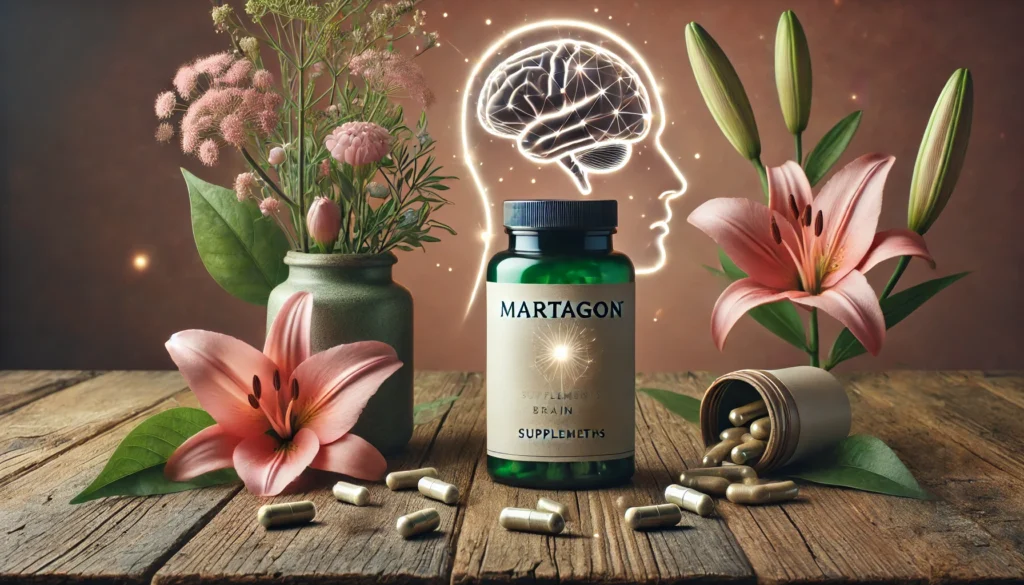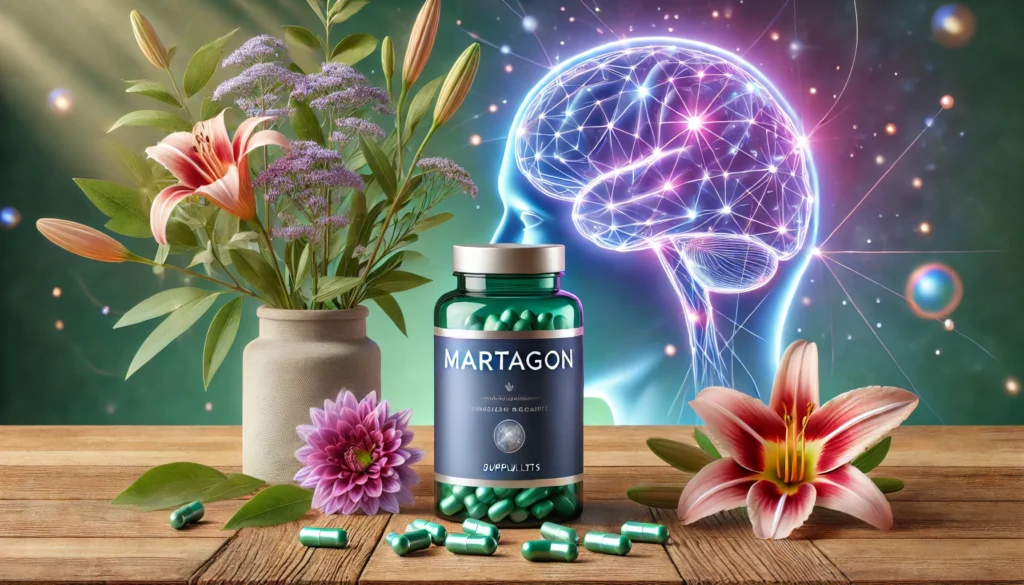Martagon is a plant that has garnered growing attention in the field of nootropic supplementation, particularly for its potential to support cognitive function. Known for its traditional medicinal uses and its rich array of bioactive compounds, Martagon may offer a range of benefits for enhancing mental performance. This article provides a comprehensive analysis of Martagon, exploring its chemistry, physiological mechanisms, nootropic benefits, recommended dosage, potential side effects, interactions with other supplements and medications, and safety considerations.
You May Also Like:
Sources of Martagon
Martagon, also referred to as Lilium martagon, is a flowering plant native to parts of Europe and Asia. The plant has been used in traditional herbal medicine for centuries, where its flowers, bulbs, and leaves were utilized for their purported health benefits. The plant is commonly found in mountainous regions, where it grows in moist soils at higher altitudes.
Martagon has been the subject of various studies due to its active compounds, including flavonoids, alkaloids, and glycosides, which are believed to contribute to its nootropic effects. Extracts from the plant’s various parts are commonly used in supplement form, often in capsules or liquid tinctures.
Unlock Brain Health and Mental Resilience with Advanced Bacopa Monnieri—Shop Now on Amazon!

Chemistry of Martagon
Martagon contains a wide range of bioactive compounds, many of which are implicated in its nootropic and health-promoting properties. These include alkaloids, flavonoids, glycosides, and phenolic acids. These compounds have been shown to possess antioxidant, anti-inflammatory, and neuroprotective properties.
- Flavonoids: These compounds are well-known for their potent antioxidant effects. Flavonoids in Martagon, such as quercetin and kaempferol, may help protect the brain from oxidative stress, a key factor in cognitive decline and neurodegenerative diseases.
- Alkaloids: Alkaloids in Martagon, like colchicine, are known for their neuroactive effects. Some alkaloids are believed to modulate neurotransmitter levels, which could contribute to improved mood, mental clarity, and overall cognitive function.
- Glycosides: These compounds have shown promise in promoting neuronal health and reducing inflammation in the brain, which is crucial for maintaining cognitive function over time.
These bioactive compounds interact synergistically, offering Martagon a broad range of therapeutic and nootropic effects. However, the exact mechanisms by which these compounds work together to enhance cognitive function are still a subject of ongoing research.
Physiological Mechanisms of Martagon in the Body and Brain
Martagon’s primary nootropic action appears to stem from its ability to modulate neurotransmitter systems, reduce oxidative stress, and promote neuroprotection. The plant’s bioactive compounds, particularly its flavonoids, are believed to exert these effects by interacting with several key systems in the body and brain.
- Antioxidant Effects: The flavonoids in Martagon, such as quercetin and kaempferol, are potent antioxidants that help neutralize reactive oxygen species (ROS) in the brain. Oxidative stress is a significant contributor to cognitive decline and neurodegenerative diseases such as Alzheimer’s and Parkinson’s disease. By reducing oxidative damage, Martagon may help preserve neuronal function and slow down the aging process of the brain.
- Neurotransmitter Modulation: The alkaloids found in Martagon are believed to influence neurotransmitter activity, including the modulation of acetylcholine, dopamine, and serotonin levels. Acetylcholine, in particular, is crucial for learning and memory, while dopamine plays a role in motivation, focus, and mood regulation. By modulating these neurotransmitters, Martagon may improve cognitive performance, enhance mood, and increase overall mental clarity.
- Neuroprotection: Some of the glycosides in Martagon may promote neuronal survival by inhibiting inflammatory pathways. Chronic inflammation in the brain is a key factor in cognitive decline and neurodegeneration. By reducing inflammation, Martagon helps protect the brain’s structures, supporting both short-term cognitive function and long-term neurological health.
These mechanisms of action suggest that Martagon may have significant potential as a nootropic supplement, especially for individuals seeking to improve mental clarity, focus, and memory.

Nootropic Benefits of Martagon
Martagon’s potential as a nootropic lies in its ability to support cognitive health and enhance mental performance. Below are some of the key benefits of using Martagon as a nootropic supplement:
- Cognitive Enhancement: The flavonoids and alkaloids in Martagon may work together to enhance cognitive function. By increasing the levels of acetylcholine and dopamine, Martagon could potentially improve memory, focus, and mental clarity. These benefits make Martagon a promising candidate for individuals experiencing cognitive fatigue or those seeking to optimize their brain function.
- Neuroprotective Properties: Martagon’s antioxidant and anti-inflammatory compounds offer neuroprotective benefits. By reducing oxidative stress and inflammation in the brain, Martagon may help protect against neurodegenerative diseases, such as Alzheimer’s and Parkinson’s. This could make Martagon a valuable supplement for individuals seeking to maintain brain health as they age.
- Mood Enhancement: The plant’s ability to modulate neurotransmitter levels, particularly serotonin and dopamine, may provide mood-boosting effects. Enhanced serotonin and dopamine activity can improve emotional well-being, reduce stress, and promote a sense of calm and focus. This could be particularly beneficial for individuals dealing with anxiety or depressive symptoms.
- Stress Reduction: Martagon’s anti-inflammatory and adaptogenic properties may help regulate the body’s response to stress. By promoting a balanced stress response, Martagon could support cognitive performance under stressful conditions and reduce the mental fog associated with anxiety or high stress levels.

Dosage and Supplementation Guidelines
While research into the optimal dosage of Martagon as a nootropic is still limited, general guidelines can be provided based on available studies and traditional usage of the plant. When considering Martagon supplementation, it is essential to be mindful of dosing to ensure both safety and efficacy.
- General Dosage: For cognitive enhancement, the typical dosage of Martagon extract in supplement form ranges from 100 mg to 500 mg per day. It is recommended to start with a lower dose and gradually increase to assess individual tolerance.
- Therapeutic Dosage: For individuals seeking more significant cognitive or neuroprotective benefits, higher doses of 500 mg to 1,000 mg per day may be appropriate, depending on individual needs and health conditions. Higher dosages should be taken under the supervision of a healthcare provider to ensure safety.
- Supplement Forms: Martagon supplements are available in various forms, including capsules, tablets, and liquid tinctures. It is advisable to follow the manufacturer’s guidelines or consult with a healthcare provider for personalized recommendations.
- Safety Considerations: Since Martagon is a powerful plant with bioactive compounds, it is important to consult a healthcare professional before starting supplementation, particularly for those with underlying health conditions or those taking other medications.
Side Effects and Safety
Martagon is generally well-tolerated when taken in appropriate dosages, but there are some potential side effects and safety concerns to consider:
- Digestive Issues: Some users may experience mild gastrointestinal discomfort, such as nausea or upset stomach, especially at higher doses.
- Allergic Reactions: Individuals allergic to lilies or other related plants may experience allergic reactions, including skin irritation or difficulty breathing. Those with known allergies should avoid Martagon supplements.
- Blood Pressure: Some compounds in Martagon may influence blood pressure. People with hypertension or those on blood pressure medication should consult their healthcare provider before using Martagon.
- Pregnancy and Breastfeeding: Due to a lack of sufficient research on the safety of Martagon during pregnancy and breastfeeding, it is advisable to avoid its use during these periods unless recommended by a healthcare provider.

Interactions with Other Supplements and Medications
Martagon may interact with certain medications or supplements. Below are a few notable interactions:
- Blood Pressure Medications: Martagon’s potential effect on blood pressure could interact with antihypertensive medications, either potentiating or reducing their efficacy. Individuals on blood pressure medications should consult with a healthcare provider before supplementing with Martagon.
- Antidepressants and Mood Stabilizers: Given Martagon’s influence on neurotransmitters like serotonin and dopamine, it may interact with medications that also affect these systems, including antidepressants and mood stabilizers. Caution should be exercised when combining Martagon with such medications.
- Other Nootropics: Martagon may be safely combined with other nootropic supplements such as caffeine or L-theanine to enhance cognitive performance. However, combining it with stimulant-based nootropics should be done with care to avoid overstimulation.
Risks for Individuals with Certain Health Conditions
- Liver or Kidney Disease: Individuals with liver or kidney conditions should be cautious when using Martagon, as its compounds may affect liver and kidney function. A healthcare provider should be consulted before starting supplementation.
- Mental Health Conditions: Those with a history of psychiatric disorders, particularly those involving neurotransmitter imbalances, should exercise caution and consult a healthcare provider before using Martagon.
Conclusion: Should You Consider Martagon as a Nootropic?
Martagon holds promise as a nootropic supplement due to its neuroprotective properties, ability to modulate neurotransmitter levels, and antioxidant effects. It may offer a range of cognitive benefits, including enhanced memory, focus, and mood regulation, making it a valuable option for those looking to optimize mental performance. Additionally, its anti-inflammatory and antioxidant properties may help protect the brain from oxidative stress and neurodegeneration, supporting long-term brain health.
However, as with any supplement, it is essential to consult a healthcare provider before use, especially for those with underlying health conditions or taking other medications. Careful consideration of the appropriate dosage and potential interactions is key to ensuring the supplement’s safety and effectiveness. If used correctly, Martagon could serve as a potent addition to your nootropic regimen, providing both short-term cognitive boosts and long-term neuroprotective benefits.

References:
- Oxidative Stress and Cognitive Decline: The Neuroprotective Role of Natural Antioxidants. Retrieved from: https://pmc.ncbi.nlm.nih.gov/articles/PMC8548611/
- Oxidative Damage and Cognitive Dysfunction: Antioxidant Treatments to Promote Healthy Brain Aging. Retrieved from: https://pmc.ncbi.nlm.nih.gov/articles/PMC4392815/
- Hacking the Brain: Dimensions of Cognitive Enhancement. Retrieved from: https://pmc.ncbi.nlm.nih.gov/articles/PMC6429408/
- Dietary Quercetin and Kaempferol: Bioavailability and Potential Cardiovascular-Related Bioactivity in Humans. Retrieved from: https://pmc.ncbi.nlm.nih.gov/articles/PMC6835347/
- Oxidative Stress in Alzheimer’s and Parkinson’s Diseases: Insights from the Yeast Saccharomyces cerevisiae. Retrieved from: https://pmc.ncbi.nlm.nih.gov/articles/PMC3371773/
Important Note: The information contained in this article is for general informational purposes only, and should not be construed as health or medical advice, nor is it intended to diagnose, prevent, treat, or cure any disease or health condition. Before embarking on any diet, fitness regimen, or program of nutritional supplementation, it is advisable to consult your healthcare professional in order to determine its safety and probable efficacy in terms of your individual state of health.
Regarding Nutritional Supplements Or Other Non-Prescription Health Products: If any nutritional supplements or other non-prescription health products are mentioned in the foregoing article, any claims or statements made about them have not been evaluated by the U.S. Food and Drug Administration, and such nutritional supplements or other health products are not intended to diagnose, treat, cure, or prevent any disease.


